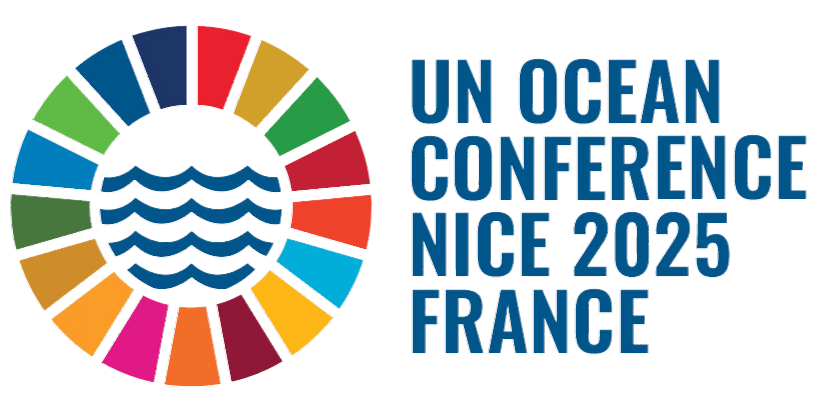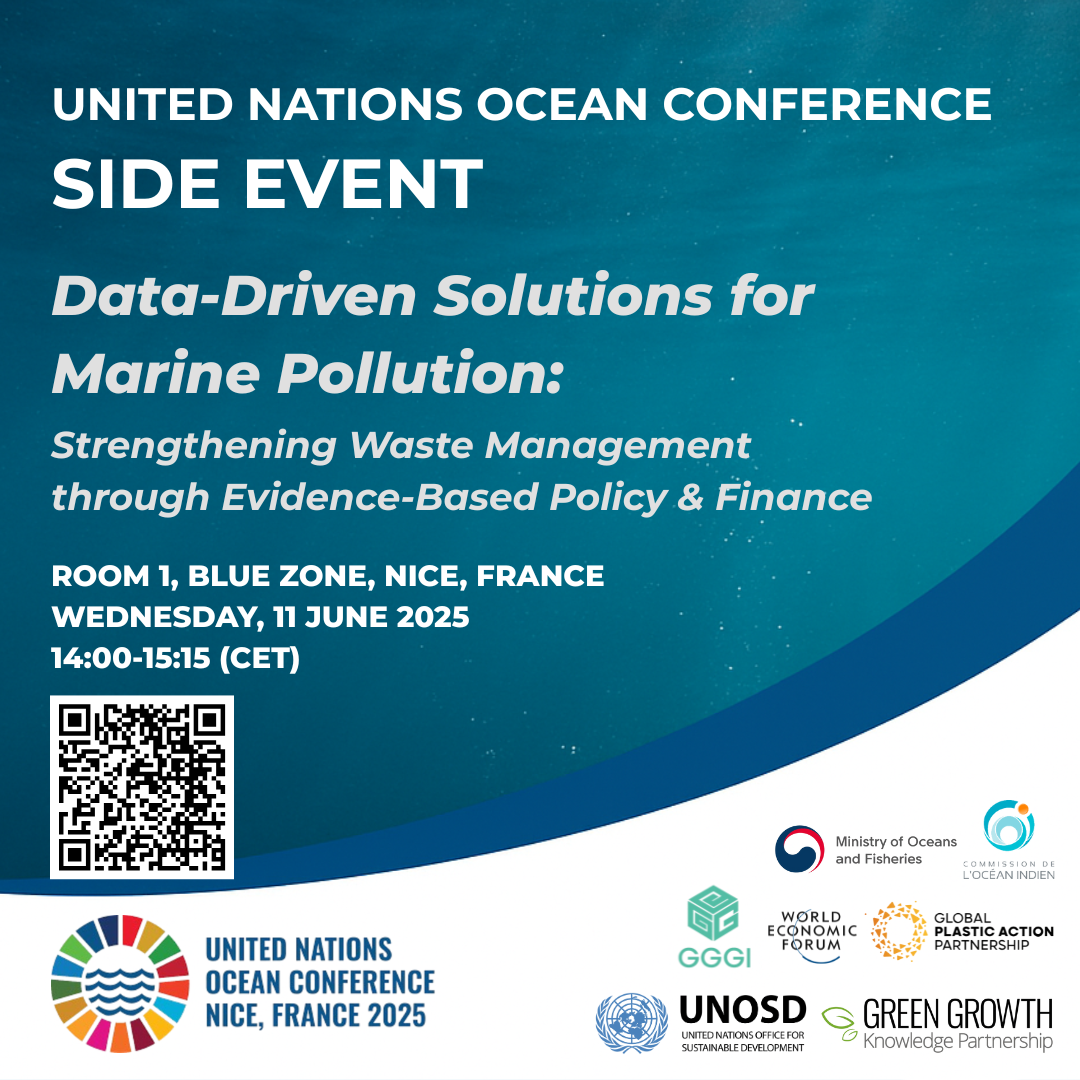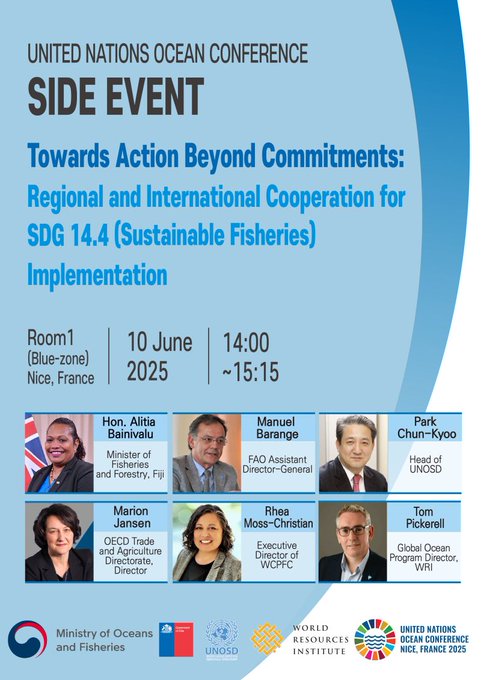[2025] Side Events at the UN Ocean Conference Nice 2025

Description
The high-level 2025 United Nations Conference to Support the Implementation of Sustainable Development Goal 14: Conserve and sustainably use the oceans, seas and marine resources for sustainable development (the 2025 UN Ocean Conference) will be co-hosted by France and Costa Rica and held in Nice, France, from 9 – 13 June 2025.
The overarching theme of the Conference is “Accelerating action and mobilizing all actors to conserve and sustainably use the ocean”. The Conference aims to support further and urgent action to conserve and sustainably use the oceans, seas and marine resources for sustainable development and identify further ways and means to support the implementation of SDG 14. It will build on existing instruments to form successful partnerships towards the swift conclusion and effective implementation of ongoing processes that contribute to the conservation and sustainable use of the ocean.
The Conference will involve all relevant stakeholders, bringing together Governments, the United Nations system, intergovernmental organizations, international financial institutions, other interested international bodies, non-governmental organizations, civil society organizations, academic institutions, the scientific community, the private sector, philanthropic organizations, Indigenous Peoples and local communities and other actors to assess challenges and opportunities relating to, as well as actions taken towards, the implementation of Goal 14. During the UN Ocean Conference, UNOSD will organize three side events.
Side Event #1 - Towards Action Beyond Commitments: Regional and International Cooperation for SDG 14.4(Sustainable Fisheries) Implementation
Time and Venue
The side event will take place on 10 June from 2pm to 3:15pm at Room 1 (Blue Zone, Port of Lympia) in Nice, France
Documents
Concept Note and Agenda (updated as of 4 June 2025)
Official Event Page by the Ministry of Oceans and Fisheries of the Republic of Korea
Background
This side event will focus on discussing the role of regional and international organizations, in particular the UN, in advancing sustainable fisheries and how their expertise and global collaboration can contribute to achieving SDG 14.4. It will also explore the efforts of Regional Fisheries Management Organizations (RFMOs) in supporting the implementation of SDG 14.4, including how they can further strengthen sustainable fishing practices and improve scientific cooperation.
The event will also discuss the future direction of ODA projects aimed at enhancing the sustainable fishing capacities of Small Island Developing States (SIDS), with a particular focus on tackling IUU fishing and improving marine resource management. Innovative solutions, such as electronic monitoring, will be explored as key strategies for developing these capacities.
Finally, the event will examine how global ocean initiatives like the Our Ocean Conference (OOC) and the United Nations Ocean Conference (UNOC) can further drive action for SDG 14.4 and other SDG 14 targets and goals that are closely interlinked. The discussion will highlight the implementation of commitments made under these initiatives and fora, which often involve cross-sectoral collaborations, and these can be enhanced to strengthen global ocean sustainability efforts.
Objectives
- Highlight the role of regional and international organizations in advancing sustainable fisheries;
- Emphasize the importance of cross-sectoral partnerships that can be strengthened through sharing expertise, knowledge, and technologies that contribute to sustainable fisheries management, and the prevention of Illegal, Unreported, and Unregulated (IUU) fishing;
- Share up-to-date technologies such as K-Electronic Monitoring technology and present how innovative technologies such as AI can drive effective policy enforcement collaboration; and
- How voluntary commitments can drive the implementation of SDG.14.4 and other targets.
Organizers
This side event is co-organized by UNOSD, Ministry of Oceans and Fisheries of the Republic of Korea, the Government of Chile, and the World Resources Institute (WRI)
Programme and Agenda
Opening Remarks
- H.E. Mr. Kang Do-Hyung, Minister of Oceans and Fisheries of Republic of Korea
- H.E. Ms. Maisa Rojas, Minister of Environment, Chile
- H.E. Amb. Peter Thomson, UN Special Envoy for the Oceans
Global Cooperation to realize sustainable fisheries (SDG 14.4)
Moderator: Mr. Kim Sungbum, Deputy Minister for Marine Policy Office, Ministry of Oceans and Fisheries of the Republic of Korea
- Hon. Alitia Bainivalu, Minister of Fisheries and Forestry, Fiji
- Mr. Manuel Barange, Assistant Director-General of FAO
- Mr. Chun-Kyoo Park, Head of UNOSD
- Ms. Marion Jansen, OECD Trade and Agriculture Directorate, Director
- Ms. Rhea Moss-Christian Executive, Director of Western and Central Pacific Fisheries Commission
- Mr. Tom Pickerell, World Resources Institute Global Director, Ocean Program )
Side Event #2 - Data-Driven Solutions for Marine Pollution: Strengthening National Waste Management Systems through Evidence-based Policy and Finance

Documents
Concept Note and Agenda (updated as of 11 June 2025)
Time and Venue
The side event will take place on 11 June from 02:00pm to 03:15pm at Room 1 (Blue Zone, Port of Lympia) in Nice, France
Background
Plastic pollution has emerged as one of the most pressing environmental challenges of our time, posing significant risks to ecosystems, economies, and human health. An estimated 11 million metric tons of plastic waste enter the ocean annually—a figure expected to nearly triple by 2040 if no meaningful interventions are made. The burden of this crisis falls disproportionately on developing countries, where limited waste management infrastructure and inadequate regulatory systems compound the problem. As plastic waste flows into rivers and coastal waters, it severely threatens marine biodiversity.
Tackling marine plastic pollution requires a systems approach that links land-based waste management with ocean health, supported by accurate data, coherent policy, and adequate financing. However, many low-income and developing countries face persistent data gaps, institutional weaknesses, and financial constraints that hinder the development and implementation of effective waste reduction strategies. These limitations not only prevent targeted policy action but also restrict the ability to track progress toward the Sustainable Development Goals (SDGs), including SDG 11 (Sustainable cities and communities), SDG 12 (Responsible consumption and production), and SDG 14 (Life below water).
In line with UNOC 03 (A/78/880), land-based sources of pollution and plastic debris density require special attention. Developing countries, particularly those with limited waste infrastructure, bear the brunt of a rising tide of plastic pollution entering waterways. Inadequate data limits the reach and impact of policy for many low-income countries. Addressing this issue requires identifying national gaps in capacity, policies, and finance for effective waste management.
This event focuses on innovations in data-driven policy, financing and collective action to stop pollution at source. Success cases presented will focus on improving waste systems to stop marine pollution and ensuring quality data to better pinpoint policy interventions and finance. Speakers will include ministers and cases from Member States cooperating with WEF-GPAP, GGGI and UNOSD to implement new data collection mechanisms and innovative financing instruments for improving waste systems and reducing marine pollution in line with SDG 14.1 (By 2025, prevent and significantly reduce marine pollution of all kinds, in particular from land-based activities, including marine debris and nutrient pollution).
The high-level 2025 United Nations Conference to Support the Implementation of Sustainable Development Goal 14: Conserve and sustainably use the oceans, seas and marine resources for sustainable development (the 2025 UN Ocean Conference) will be co-hosted by France and Costa Rica and held in Nice, France, from 9 – 13 June 2025.
As part of its aim to strengthen UN Member States’ capacity to plan and undertake integrated sustainability transformation especially on SDGs 11,12 and 14, UNOSD will submit a Voluntary Ocean Commitment (VOC) to support developing countries in creating data-driven policies and address capacity gaps to tackle marine pollution at source through its new Waste Management and Circular Economy Policy Support System developed with Green Growth Knowledge Partnership (GGKP).
Objectives
- Share insights on the latest data-driven approaches to understanding and addressing marine plastic pollution, with a focus on the challenges faced by developing countries with limited waste infrastructure and data-limited contexts.
- Present practical examples of integrated policy solutions and outcome based financing mechanisms being implemented to prevent plastic pollution at source.
- Discuss national experiences and collaborative models that leverage data, innovation, and capacity-building to transform waste management systems and advance circular economy practices aligned with SDGs 11, 12, and 14.
- Inspire collective action by governments, development partners, and the private sector to invest in scalable, evidence-based strategies and technologies aimed at reducing land-based sources of marine pollution.
Organizers
This side event is co-organized by the United Nations Office for Sustainable Development (UNOSD) under the Division for SDGs of the UN Department of Economic and Social Affairs (UNDESA) with the Ministry of Ocean and Fisheries of ROK, Green Growth Knowledge Partnership (GGKP), the World Economic Forum Global Plastic Action Partnership (GPAP), and the Global Green Growth Institute (GGGI) and the Indian Ocean Commission.
Programme and Agenda
Opening and Welcoming Remarks
- Mr. Chun Kyoo Park, Head, United Nations Office for Sustainable Development, DESA
- Ms. Clemence Schmid, Director, Global Plastics Action Partnership, World Economic Forum
High Level Statements
- H.E. Mr. Kang Do-Hyung, Minister of Fisheries and Ocean, Republic of Korea
- Mr. Kamal Kishore, Special Representative of the United Nations Secretary-General (SRSG) for Disaster Risk Reduction
Panel Discussion
Chair: Ms. Clemence Schmid, Director, Global Plastics Action Partnership, World Economic Forum
- Ms. Junu Shrestha, Senior Environmental Specialist, The World Bank Group
- Ms. Ingvild Solvang, Director of Climate Action and Inclusive Development (CAID), GGGI • Ms. Janalezza Morvenna, Green Growth Knowledge Partnership (GGKP)
- Ms. Janalezza Morvenna, Green Growth Knowledge Partnership (GGKP)
- Ms. Tiana Eva Razafindrakoto, International Expert in Economic Diplomacy Indian Ocean Commission
- Mr. Nassim Oulmane, Chief, Natural Resources, Green and Blue Economy Section, UN Economic Commission for Africa
Closing Remarks
- H.E. Mr. Chung Keeyong, Ambassador for Climate Change, Republic of Korea
Side Event #3 - Scaling Blue Carbon Investments: Enabling Financing for Seagrass and Coastal Ecosystems
Documents
Concept Note and Agenda (updated as of 4 June 2025)
Time and Venue
The side event will take place on 12 June from 02:00pm to 03:15pm at Room 1 (Blue Zone, Port of Lympia) in Nice, France.
Background
Blue carbon ecosystems–including seagrasses, mangroves, and salt marshes–sequester carbon at often higher rates than terrestrial forests, while simultaneously buffering coastal communities from storm surges, sustaining marine biodiversity, and supporting livelihoods through fisheries, ecotourism, and ecosystem services. Yet despite their immense value, these ecosystems remain severely underfunded, under-protected, and underrepresented in climate finance frameworks.
This joint side event, hosted by the Global Green Growth Institute (GGGI) and Notre Grande Bleu (NGB) in partnership with the International Union for Conservation of Nature (IUCN) and with support from partners including the United Nations Office for Sustainable Development (UNOSD [DESA]), the Caribbean Biodiversity Fund (CBF), the Mediterranean Posidonia Network (MPN), and the Agence Française de Développement (AfD) alongside national government counterparts from Kenya, Indonesia, and France will examine how investments in seagrass ecosystems and blue carbon can be structured to achieve climate action, biodiversity restoration, and resilient coastal development.
By bridging science, policy, and finance, the session will explore regional initiatives to promote blue carbon from around the world. It will highlight global best practices and introduce new tools such as seagrass policy-finance roadmaps and regional ecosystem baselines. It will also spotlight emerging investment mechanisms and Article 6-aligned carbon markets that can scale nature-positive ocean finance. We will explore various approaches to scaling up finance for blue carbon ecosystems and how effective policy forms the backbone of those efforts.
Objectives
- Highlight the role of blue carbon in delivering climate, biodiversity, and development benefits and showcase regional approaches of framing policy through science to enable effective ecosystem management
- Share best practices on scaling seagrass, mangrove, and coastal ecosystem investments from regions around the world
- Discuss innovative financial mechanisms to support blue carbon investments
- Present the science-policy and policy-finance pipeline that can enable ecosystem investments and drive resilience
Organizers
This side event is jointly organized by UNOSD, Global Green Growth Institute, Notre Grande Bleu, and IUCN.
Programme and Agenda
Session Opening
- Ingvild Solvang, Director of Climate Action & Inclusive Development, GGGI
Welcome Remarks
- H.E. Paubert Tsimanaoraty Mahatante, Minister of Fisheries and Blue Economy, Republic of Madagascar
- H.E. Fabrice Gilles David, Minister of Agro-Industry and Blue Economy, Republic of Mauritius
- H.E. Armando Paino, Minister of Environment and Natural Resources, The Dominican Republic
Framing the Conversation: How Science an Enable Effective Policy for the Regenerative Blue Economy
- Barkha Mossae, Regenerative Blue Economy Manager, IUCN
Panel 1: Science for Policy Action Discussion on ecosystem mapping, MRV, and science-policy tools for coastal resilience and NDCs.
Moderator: Mercedes Munoz, Marine Biodiversity & Blue Economy Manager, IUCN
- Dr. Ahmed Ghedira, President, Notre Grande Bleu
- Mr. Park Chun Kyoo, Head, UNOSD(DESA)
- Ms. Florence Merle, Deputy Director of European and International Relations, French Office for Biodiversity
Framing the Conversation: How Effective Policy and Innovative Finance can Enable Blue Carbon Investments
- Michael Bak, Senior Analyst Adaptation & Resilience, GGGI
Panel 2: Scaling Finance for Blue Carbon Ecosystems
Moderator: Ingvild Solvang, Direct of Climate Action & Inclusive Development, GGGI
- Tadzio Bervoets, Sustainable Blue Finance Lead, Caribbean Biodiversity Fund
- Samuel Henry, Blue Carbon Facility Coordinator, AfD
- Mercedes Munoz, Marine Biodiversity & Blue Economy Manager, IUCN
Closing Remarks
- Hendra Yusran Siry, Senior Advisor to the Minister of Indonesia's Ministry of Marine Affairs and Fisheries on Ecology and Marine Resources
Code of Conduct
The organizations of the United Nations system are committed to enabling events at which everyone can participate in an inclusive, respectful and safe environment.
UN system events are guided by the highest ethical and professional standards, and all participants are expected to behave with integrity and respect towards all participants attending or involved with any UN system event: https://www.un.org/en/content/codeofconduct/


